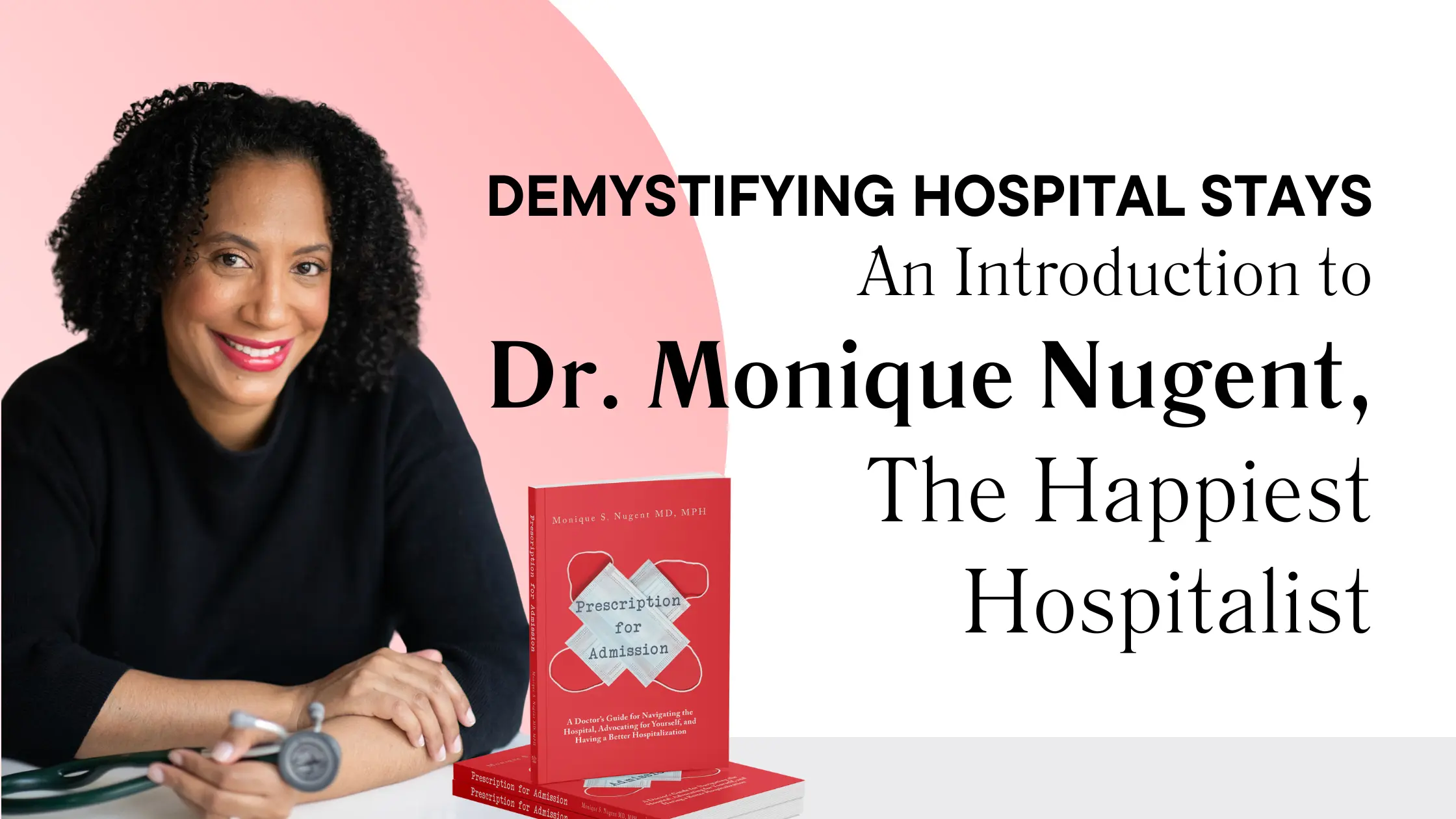Hello, and let me introduce (or reintroduce) myself. My name is Dr. Monique Nugent; I’m a practicing hospitalist and the author of Prescription for Admission: A Doctor’s Guide for Navigating the Hospital, Advocating for Yourself, and Having a Better Hospitalization. Usually, when I make that introduction, I get two immediate questions: 1- What is a Hospitalist? and 2- What is your book about? Since this is an introduction, let’s get those questions answered.
What is a Hospitalist?
As a board-certified internist, I can work in many care settings, but I have chosen to work solely in hospitals; thus, I am a hospitalist. Hospitalists are usually internists or family practice physicians. NPs and PAs also work as hospitalists. Other specialties, such as Pediatrics and Obstetrics, also have physicians who only work in hospitals (i.e., pediatric hospitalists & laborists), but as an internist, I typically care for non-pregnant adults. I’ve worked in two VA hospitals, two academic hospitals, two county hospitals, and two community hospitals. Each hospital I’ve been in has been unique, but they are also very similar in many ways.
You see, I’ve been roving the halls of hospitals since I was a third-year medical student, enthralled when listening to the residents describing their days in the hospital, being filled with complex procedures, rare diagnoses, and intricate medical plans. At Loma Linda University, where I completed both my medical school and residency training, I had brilliant attendings who trained me to focus on creating carefully thought-out care plans to address patients’ most pressing medical needs and then switch gears to help guide their care after a hospitalization. I’m blessed to have a career where I can use my knowledge and skills to help others at their most vulnerable times.
What is your book about?
On its face, Prescription for Admission is a book about what to expect and how to advocate effectively for yourself during a hospitalization. But this book is much more; it is an easy-to-read cheat sheet created from a brain dump of everything I’ve seen in the almost fifteen years I’ve worked in hospitals. My goal with Prescription for Admission is to demystify everything that happens when someone is hospitalized, describe who is who, what is what, why things happen, and how you can maximize every interaction with the various healthcare providers who work there.
When meeting with a patient for the first time, I can generally predict what non-medical things will cause them some trouble and complicate their time in the hospital. I developed this oddly specific sixth sense because our healthcare system presents everyone with the same pitfalls that some people have the knowledge and support to avoid while others don’t. I wrote Prescription for Admission to give everyone the tools needed to be more prepared during a hospitalization. I wrote this book for all the caretakers who dread the confusion they know will occur when their loved one is in the ER. I wrote this book for all the people who find themselves in the hospital with a new and scary diagnosis and will now have to plan for ongoing treatments. I wrote this book for all the family members who will drop everything and rush to the bedside of a loved one who has suddenly fallen ill. I also wrote this book for all the healthcare providers who wonder why their patients seem so anxious and confused about everything happening in the hospital.
Someone once asked me if I wrote Prescription for Admission to teach people how to “hack a hospital stay” or “win” at being hospitalized. I must admit that I bristle at that type of description. It may seem a quick and catchy thing to do: give tips that sound easy and generally applicable to everyone so people think I’ve given good advice. The truth is, there is no “hack” that can immediately stop someone from being sick or in pain, nor is it helpful to give people experiencing a hospitalization some trite but not applicable advice just because it sounds catchy. There is no easy way to “win” a hospitalization, and I won’t lead people astray to think there is.
I know how privileged I have been professionally and personally that being at the hospital has always been my choice, a choice that many people don’t get because of illness or injury. Having worked in eight different hospitals across both coasts of the US, I’ve seen the same patterns emerge to cause confusion and frustration for patients and their loved ones during and after a hospital stay. I see Prescription for Admission and this community as a natural extension of my work to improve the experience and safety of the hospital by speaking directly to patients.
Last February, when I released Prescription for Admission, I naively thought everyone would be as excited to discuss the inner workings of a hospital stay as I am. I was also naive about what it would take to get the message out about the book and my mission to empower patients to be the driver of their care in the hospital. I wrongly thought my dedication to patients and my work was enough to get noticed and drive people to this great resource I created. Oh boy, was I wrong! Though I’ve done several guest spots on various podcasts and have done some teaching sessions, things have been slow for the book itself. This lackluster performance is disappointing because many more people would benefit from the information and exercises in the book.
Looking back, I know that the missing piece of the puzzle is me. I wasn’t very present and didn’t spend the necessary time building a community and sharing consistently. So, taking the lessons learned in 2023 I’m doing a relaunch in 2024! You can expect to get more blog posts, podcasts, and sharing in general. Consider me your source for all things HOSPITAL. I will be sharing information about everything you need before, during, and after a hospitalization and about healthcare policies, community services, and other things that can help get you and your loved one through interactions with hospitals.
Though things were rough last year, I learned a great deal about people’s concerns surrounding hospitals and healthcare.
Here are a few lessons I learned in the past year: 1- Nobody is excited to talk about hospitals; people tend to find my book during moments of crisis. 2- Those proactively seeking help with hospitalizations are usually caretakers or people with prior lousy hospital experiences. 3- I can’t talk about hospitalizations without talking about fear of pain and loss of autonomy. 4- The public needs information about how insurance and healthcare regulations affect hospital care. 5- People need help planning for life after a hospitalization. These are some of the topics I will start writing about, and I will take your feedback and questions so we can grow together from there.
Thank you so much for being an early part of my community. It is my sincere hope that I will become your source for truthful, honest information that will help you take care of yourself and those you love if you ever need to go to the hospital. I have some big plans for this year, so stick with me!





